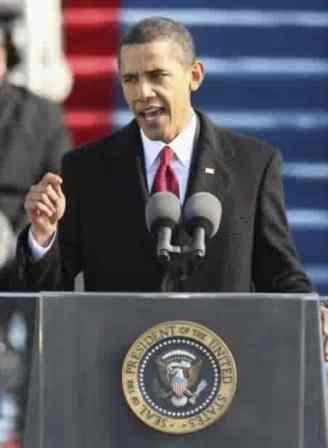|
restoring our biblical and constitutional foundations
|
Obama’s Sermon on the Steps
This week we
witnessed a historic event in U.S. history as Barack Hussein Obama
became our forty-fourth president. To me, the most interesting moment of
Mr. Obama’s inaugural address was when he quoted Scripture, not
(refreshingly) in
support of American imperialism, but rather to suggest that America
needs to
 grow
up and “set aside childish things” (1 Cor. 13:11).
“The
greatness of our nation,” he told us, “is never a given. It must be
earned.”
grow
up and “set aside childish things” (1 Cor. 13:11).
“The
greatness of our nation,” he told us, “is never a given. It must be
earned.”
This is, of course, exactly how our Founders envisioned our nation – a nation in which its citizens are givers and not getters, a nation in which its citizens do not look to government to solve their societal ills, a nation in which liberty from government is emphasized rather than dependence on government. The downside of all the pageantry this week is that when Mr. Obama says, “Yes, we can,” the “we” he is referring to is government. So we can expect Mr. Obama to raise wages, create jobs, provide universal medical care, improve education and energy sources, all the while contradicting the very concept on which America was founded. This will mean higher taxes and the perpetuation of a distorted economy in which getting into trouble as a corporation means the taxpayers will bail you out.
Hillary Clinton put it this way: “When Barack Obama is in the White House, he’ll revitalize our economy, defend the working people of America, and meet the global challenges of our times.” And presumably rest on the seventh day. As a boy I used to hear politicians speak about “personal responsibility.” I had a very vague idea of what they meant. The years have passed and since then I have learned that what they meant makes all the difference in the world. I’m quite sure it didn’t mean the unilateral expansion of executive power. I’m quite sure it didn’t involve the authority to wiretap without a warrant. I’m quite sure it didn’t mean holding “unlawful enemy combatants” forever. I’m almost certain it didn’t mean using coercion to “spread the wealth” from rich to poor and middle class. I’m pretty sure it didn’t mean expanding the Department of Education (which Republicans once vowed to abolish). I’m certain it didn’t mean supporting out-of-control entitlements. I’m sure it didn’t mean blaming the free market for problems caused by government. And I’m sure it didn’t mean underwriting foolish lending practices that only undermine capital markets.
Well, what did it mean? Jacob Hornberger puts it simply when he writes:
In 1787, the Framers brought into existence the U.S. federal government, a government whose powers were expressly restricted by the Constitution. Our ancestors understood what all too many Americans today fail to appreciate — that the biggest threat to people’s lives, liberties, and fortunes lies with their own government, which is precisely why they used the Constitution to severely constrain the government’s powers.
Our ancestors brought into existence the freest society in history, slavery notwithstanding. No income tax. No Federal Reserve. No welfare. No Social Security. No Medicare or Medicaid. No public schooling. No paper money. No gun control. No immigration controls. No trade protectionism. No drug war. No military-industrial complex. No foreign empire. No foreign wars. Minuscule government spending and borrowing. Sound money. Unlimited accumulation of wealth. Free markets. Liberty of contract. Private enterprise free of government control or regulation.
Does Barack Obama understand any of this? Time will tell. But it’s not enough for him to quote a Bible verse (out of context). I suspect that many politicians today patronize God instead of obey Him. Religion these days has become an indispensable part of American politics, and everyone has a good word for God. Any politician can add a Bible verse to a speech. People will think it means a great revival. Already some are referring to Mr. Obama’s inaugural speech as the “Sermon on the Steps.” How much of it is a substitute for the real thing? I do not know the answer. But I do know that the pernicious health, wealth, and happiness Gospel is found not only in our churches. It is ubiquitous in Washington as well.
My question for the new president is a simple one: Are you a patron of the Almighty or His servant? In the meantime, Christians need not join the befuddled multitude, wringing their hands and wondering what our nation is coming to or, conversely, praising the new messiah. God has told us what we are to be about – the Gospel business – and we know what time it is: the end times when many false saviors will appear with their strange recipes for health, wealth, and happiness.
January 22, 2009
David Alan Black is the editor of www.daveblackonline.com.